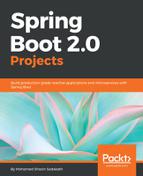Implementing the domain model Taxi using Spring Data Redis annotations will look like the following, which is available in spring-boot-2-taxi-service:
@RedisHash("Taxi")
@Data
@AllArgsConstructor
@NoArgsConstructor
public class Taxi implements Serializable {
@Id
private String taxiId;
private TaxiType taxiType;
private TaxiStatus taxiStatus;
}
Implementing the domain model TaxiBooking using Spring Data Redis annotations will look like the following which is available in spring-boot-2-taxi-book-service:
@RedisHash("TaxiBooking")
@Data
@AllArgsConstructor
@NoArgsConstructor
public class TaxiBooking {
@Id
private String taxiBookingId;
private Point start;
private Date startTime;
private Point end;
private Date endTime;
private Date bookedTime;
private Date acceptedTime;
private Long customerId;
private TaxiBookingStatus bookingStatus;
private String reasonToCancel;
private Date cancelTime;
private String taxiId;
}
The @RedisHash annotation is used to store the contents of this domain model as a Redis Map with @Id used to mark the id field for this model. The annotations @Data is from Lombok library to generate toString, equals, hashCode, and getters/setters for this model. The start and end attributes are of type org.springframework.data.geo.Point, which is used to store coordinates. The @AllArgsConstructor annotation is used to generate the all arguments constructor and @NoArgsConstructor is used to generate a default constructor without any arguments.
